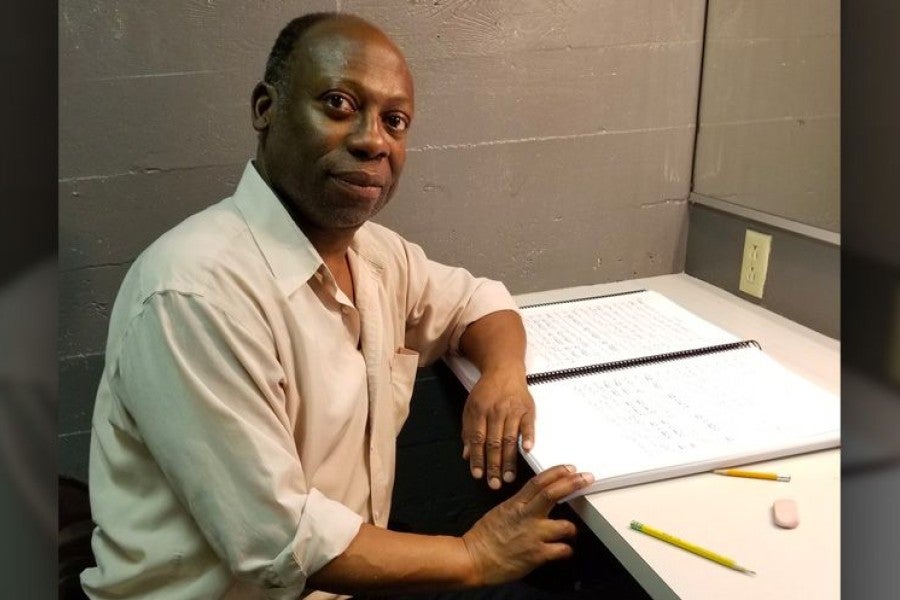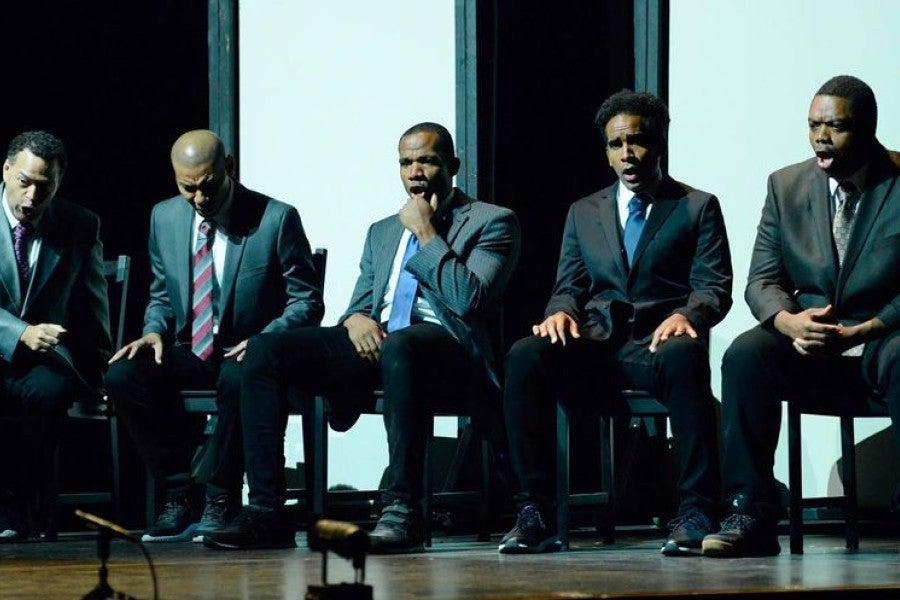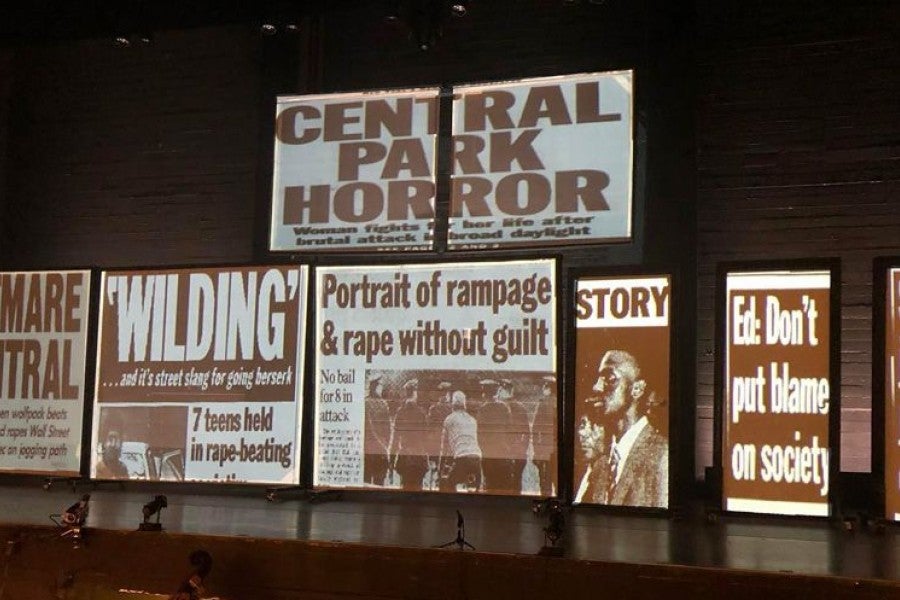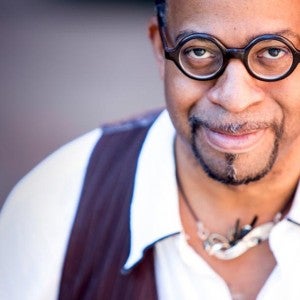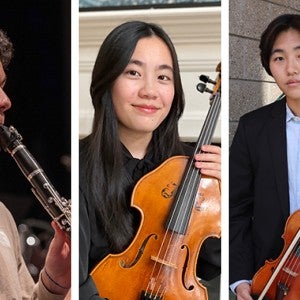Applications are still open for Arts Camp and Arts Academy. Programs fill quickly—submit your app today!
Dunner conducts “Central Park Five”
Interlochen Arts Academy Orchestra Conductor Dr. Leslie B. Dunner discusses conducting the world premiere of the “Central Park Five” opera.
Update: On May 4, 2020, Anthony Davis was awarded the 2020 Pulitzer Prize in Music for "The Central Park Five".
At the time it was considered to be the crime of the century.
A group of five black and Latino teens, dubbed the “Central Park Five” by the media, were wrongfully accused and convicted of the brutal assault of a Manhattan jogger.
In the years following their exoneration through DNA evidence, the story has been revisited and retold throughout popular media. In June, a new retelling in the form of an opera premiered at the Warner Grand Theatre in San Pedro, California with Interlochen Arts Academy Orchestra Conductor Dr. Leslie B. Dunner at the podium.
The opera, The Central Park Five, opened on June 15, 2019 and featured music by noted pianist and composer Anthony Davis with libretto by Richard Wesley. Dunner, who had teaching and conducting obligations at Interlochen Arts Academy until May 25, was intent on making the tight turnaround work.
“I left Interlochen after graduation on the 25th and began rehearsals the following day,” Dunner said. “I had two weeks of rehearsal, and after week one [Davis] gave me a new orchestra score. I had 600 new pages to learn.”
Though Dunner’s involvement with the show came fairly late in production, work on the opera began in 2014 when Kevin Maynor, Executive and Artistic Director of Trilogy: An Opera Company, approached Davis with an early draft of Wesley’s libretto for the show.
Trilogy, a Newark, New Jersey-based group, is one of the few organizations in the country committed to sharing the African-American experience through their artistic endeavours; with past productions including operatic works about Nat Turner’s slave rebellion, orator and statesman Frederick Douglass, abolitionist Harriet Tubman, and baritone Paul Robeson. Dr. Dunner is also their Resident Conductor.
Trilogy’s Five opened in 2016, and shares a number of similarities with the 2019 iteration. On May 31, 2019, Netflix released director Ava DuVenary’s four-part miniseries, When They See Us. Although the mediums differ, Dunner notes that both the drama and opera often paralleled. “There was a scene where language was exactly the same save for one odd detail,” Dunner said: the librettist swapped Attica for Rikers Island. However, Dunner adds that the media firestorm surrounding the Central Park Five meant that almost every aspect of the case was documented in the news. Because of that, little of Central Park Five is conjecture. The opera even went as far as adding projections of tabloids, newspapers, and footage from 1989 to the set to help ground the show in reality.
From Handel’s Julius Caesar to John Adams exploring Nixon in China, there is a centuries-old tradition of basing operas on real people, places, and events. However, in 2019, questions arose about the efficacy of telling the story of the Central Park Five as an opera.
“Anthony Davis said something very interesting,” Dunner said. “He had an interview where he was asked what he thought was relevant with opera. Because the interviewer said, ‘Opera was becoming a dead medium.’ And Anthony replied, ‘No. It's not a dead medium. It's a dead medium for your stories. It's not a dead medium for our stories because our stories have not been told in opera.’”
In Central Park Five, the story isn’t the only component that’s contemporary. The show incorporates elements of blues, free jazz, big band music, and hip-hop—genres pioneered by African-American artists.
When it was revealed that Central Park Five contained an homage to Duke Ellington, people began searching for it. The nod, Dunner revealed, was not from one of Ellington’s more popular works.
“There's a two note theme that comes in at the beginning of the show and again at the end, and it's to the word ‘Harlem,’” Dunner said. “Many people don’t know this, but Duke Ellington wrote two orchestral pieces in his lifetime: The River and Harlem. Now Harlem opens with a trumpet playing that theme. Davis lifted those two notes because that part of Central Park is in Harlem.”
For Dunner, Harlem wasn’t just a setting for the show, but a significant part of his own life. “I grew up in the area where all of this took place,” Dunner said. From where When They See Us opens, I lived eight blocks away. In part two, there is a scene just two blocks away from where I lived. I used to go to that part of Central Park as a kid. All of what went on during that time I have been through.”
At the time of their arrest in 1989, the five accused boys were 14 to 15 years old. Though the five male leads play both the young and adult versions of their characters, the emotional impact is not lost. Early on in rehearsals, Dunner had a moment at the podium that took him back to his own childhood.
“There’s a scene where the parents go to the precinct to meet their children,” Dunner said. “At one point, the mother of one of them comes to the door of the precinct, and I had this flashback. The actor’s hair was the same as my mom’s. She was wearing a glittery top. My mom would wear glittery tops. And when she came through that door, I had this moment of looking up at my mom, and it was surreal.”
“For a few days, every time she came through that door it took me out of the present and into the past. That was hard to reconcile.”
Though Central Park Five ends with the accused finding closure as adults, the show reminds us that the cultural, racial, and socio-economic issues that made the case front-page news 30 years ago still exist today.
“The cycle is still being perpetuated,” Dunner said. “What happened to them should not be happening anymore. Yet it is still happening. That is the relevance. That's why this was important.”
Whether it’s with the Long Beach Opera or Interlochen Arts Academy Orchestra, Dunner reiterates the importance of using the arts to tell these stories.
“We are just now coming to the foreground,” Dunner said. “So we are using this medium to tell our stories, and we are modifying the medium so that it's relevant to our population, and that's what's interesting, and that's what's exciting, and that's what I want to be a part of.”
